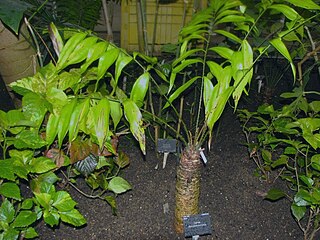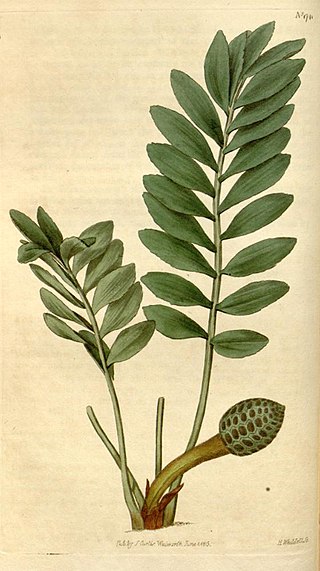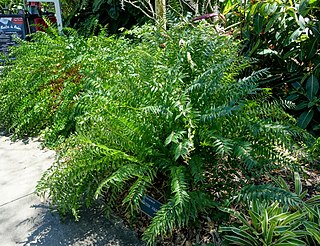
Juniperus standleyi is a species of juniper native to Guatemala and the adjacent extreme southeast of Mexico, where it occurs at elevations of 3,000–4,250 metres. Its local common names include huitó, cipres, and huitum.
Zamia amplifolia is a species of plant in the family Zamiaceae. It is endemic to the Calima River watershed of Valle del Cauca Department, Colombia. It is threatened by habitat loss.

Zamia angustifolia is a species of plant in the genus Zamia. It is found in the Bahamas, where it is threatened by habitat loss, and in Cuba, where it is abundant.
Zamia cremnophila is a species of plant in the family Zamiaceae. It is endemic to the state of Tabasco in Mexico, between Teapa and Tapijulapa.
Zamia herrerae is a species of plant in the family Zamiaceae. It is found in El Salvador, Guatemala, Honduras, and Mexico. It is threatened by habitat loss.
Zamia lecointei is a species of plant in the family Zamiaceae. It is found in Brazil, Colombia, Peru, and Venezuela. It is threatened by habitat loss.
Zamia macrochiera is a species of plant in the family Zamiaceae. It is endemic to Peru. It is found near the towns of Pebas and Pucaurquillo in Maynas Province, Loreto Region; plants are found near the Rio Amiyacu and Rio Napo. It is threatened by habitat loss, and is considered critically endangered by the IUCN.

Zamia manicata is a species of plant in the family Zamiaceae. It is found in Colombia and Panama. Its natural habitat is subtropical or tropical moist lowland forests. It is threatened by habitat loss.
Zamia montana is a species of plant in the family Zamiaceae. It is endemic to Antioquia Department, Colombia. Its natural habitat is subtropical or tropical moist montane forests. Zamia montana is extremely rare and is unknown in cultivation. Its habitat is also extremely threatened by logging activities. In fact, it may well be extinct in the wild because the only known population occurs in an area that was recently logged.
Zamia monticola is a species of plant in the family Zamiaceae. It is endemic to Guatemala. It is threatened by habitat loss.
Zamia muricata is a species of plant in the family Zamiaceae. It is found in Colombia and Venezuela. It is threatened by habitat loss.
Zamia poeppigiana is a species of plant in the family Zamiaceae. It is found in Colombia, Ecuador, and Peru. It is threatened by habitat loss.
Zamia prasina is a species of plant in the family Zamiaceae. It is native to Yucatán, Campeche, Quintana Roo, Tabasco and Chiapas in Mexico and Guatemala and Belize. Its natural habitat is subtropical or tropical moist montane forests. It is threatened by habitat loss.

Zamia pseudomonticola is a species of plant in the family Zamiaceae. It is found in Costa Rica and Panama. Its natural habitat is subtropical or tropical moist montane forests. It is threatened by habitat loss.

Zamia pygmaea is a species of plant in the family Zamiaceae found only in Cuba. It is the smallest living cycad. It is listed as critically endangered on the IUCN Red List based on its limited distribution, severely fragmented habitat, and population of less than 250 mature individuals.
Zamia soconuscensis is a species of plant in the family Zamiaceae. It is endemic to the Soconusco Mountains of Chiapas, Mexico. It is threatened by habitat loss. About 5,000 individuals remain in the wild.

Zamia variegata is a species of plant in the family Zamiaceae. It is native to Belize, Guatemala, Honduras, and Mexico. It grows in forests. It is threatened by habitat destruction, which has likely reduced the population by about 50% over the last few decades.

Zamia vazquezii is a species of plant in the family Zamiaceae. It is endemic to northern Veracruz state, in eastern Mexico. It is a Critically endangered species, threatened by habitat loss. There are only two wild populations with no more than a combined total of 50 individuals.

Zamia erosa is a species of cycad native to the Caribbean islands of Jamaica, Cuba, and Puerto Rico, described by Orator Fuller Cook and Guy N. Collins in 1903. The species formerly known as Z. amblyphyllidia was determined in 2010 to be the same species as Z. erosa. It is listed as vulnerable by the IUCN Red List.
Zamia stricta is a species of cycad in the family Zamiaceae. It is endemic to Cuba.









